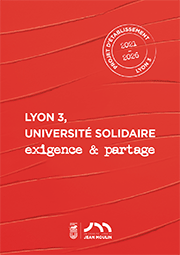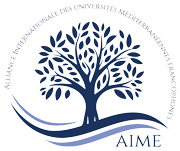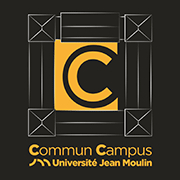AccueilRechercheProgrammes et productions scientifiquesThèsesThèses soutenuesThèses soutenues - 2006-2021Thèses soutenues - 2017
-
Partager cette page
- Recherche,
GOVERNATORI Luca
Les ? Nuits ? de C.G. Jung Origine et fondements d’une psychologie cosmique
Publié le 9 janvier 2018 – Mis à jour le 15 janvier 2018
Thèse en Philosophie – ?tude des Systèmes, soutenue le 15 décembre 2017.
Il y eut sans doute deux Jung. Celui qui s’adressa à son époque, psychiatre, théoricien d’une psychologie de l’inconscient, et celui qui vécut la nuit, solitaire, homme de l’ombre, consignant ses expériences ? secrètes ? (visions, rêves, dialogues avec l’?me) dans un ouvrage qui ne fut jamais publié de son vivant : le LIVRE ROUGE. Jung tente d’y traduire les ? inexprimables ? régions de la psyché dont les cratères s’ouvrirent ainsi à lui, lieux d’exils et de découvertes, comme si s’était révélé, à travers eux, le plus incandescent langage de l’inconscient. La somme de ces retranscriptions donne un livre polymorphe, endiablé par des images, des incantations, des dialogues avec les morts. Sous l’emprise totale de l’imaginaire, Jung décrit une extravagante déambulation intérieure, une généalogie vivante des métamorphoses de l’?me, une odyssée des morts. Et même une cosmologie. De quoi le LIVRE ROUGE pourrait-il donc être, dans ces conditions, le témoignage ? En quel sens a-t-il pu constituer, comme Jung le confiera en fin de vie, le noyau de tous ses travaux ? Un livre sauvage et halluciné peut-il véritablement donner lieu aux principes méthodologiques et thérapeutiques d’une psychologie de l’inconscient ? Est-ce l’occasion d’y découvrir le propre d’un langage primitif de la psyché, un langage de la ? nuit ? ? Est-il un pas de c?té, en direction de l’Orient, afin d’adapter notre approche de l’inconscient aux principes d’une sagesse ou d’une mystique ? Existerait-il donc une psychologie, fondée sur un tel rapprochement, dont les principes puissent irriguer, comme une seule et même vague, les plaines de l’Orient et de l’Occident ? Y trouverait-on l’invitation à recomposer des affinités avec les pratiques divinatoires ? Si nous tentons de relier la science empirique de Jung à la cosmogonie décrite par le LIVRE ROUGE, serions-nous alors en mesure de fouler le sol (racines historiques et socle épistémologique) d’une psychologie cosmique ? Est-il en effet possible d’ajuster les concepts traditionnels de l’inconscient aux ivresses d’une cosmologie primitive et imaginaire ? Serait-ce là le projet, à entrevoir et définir, d’une cosmologie de l’inconscient ?
There were without doubt two Jung. The one who lived in his time, the psychiatrist, theorist of a psychology of the unconscious, and the one who lived at night, man of the shadows, recounting his “secret” experiences (visions, dreams, dialogues with the soul) in a book that was not published during his lifetime : the RED BOOK. In it, Jung tries to articulate the “inexpressible” regions of the psyche whose craters opened up to him in this manner, places of exiles and of discoveries, revealing the most incandescent language of the unconscious. The result is a polymorphous work, a frenzy of images, incantations and dialogues with the dead. Under the total control of an imaginary world, Jung describes an extravagant inner journey, a live genealogy of the metamorphoses of the soul, an odyssey of the dead. And even more : a cosmology. As such, what is the RED BOOK thus an account of ? In what way does it represent, as Jung revealed at the end of his life, the nucleus of his lifetime work ? Can a book that is wild and hallucinatory truly engender methodological and therapeutic principles of a psychology of the unconscious ? Does it provide the opportunity to discover the characteristics of a primitive language of the psyche, a language of the “night” ? Is it a sidestep towards the Orient, so as to adapt our approach of the unconscious to the principles of a wisdom or a mystical way ? Does a psychology therefore exist, founded on this analogy, whose principles can irrigate, like a single and only wave, the plains of the Orient and of the Western world ? Does it provide us an invitation to reconstruct an affinity with the practice of divination ? If we try to connect Jung’s empirical science with the cosmogony described by the RED BOOK, would we be able to walk on the ground (the historical roots and epistemological base) of a cosmic psychology ? Is it in fact possible to adjust the traditional concepts of the unconscious to the exhilaration of a primitive and imaginary cosmology ? Would this be the project, to discern and to define, that underpins a cosmology of the unconscious ?
Mots-clés / Keywords :
C.G. Jung // C.G. Jung, Inconscient // Unconscious, Soi // Self, Psychologie // Psychology ,Cosmologie // Cosmology, Non-Dualité // Non-Duality, Orientalisme // Eastern thought, Folie // Madness, Mystique sauvage // Wild mysticism, Karma // Karma, Ombre // Shadow, Synchronicité // Synchronicity, Divination // Divination, Livre Rouge // Red Book, Individuation // Individuation, Imaginaire // Imagination
Directeur(s).trice(s) de thèse : M. Jean-Jacques WUNENBURGER
Membres du jury :
M. Pierre FAURE, Auteur,
Mme Véronique LIARD, Rapporteur, Professeure des universités, Université de Bourgogne, Dijon,
Mme Christine MAILLARD, Rapporteur, Professeure des universités, Université de Strasbourg,
M. Jean-Jacques WUNENBURGER, Professeur des universités émérite, Université Jean Moulin Lyon 3.
Président.e du jury : Mme Christine MAILLARD
Equipe d'accueil : IRPHIL
Décision : Admis
There were without doubt two Jung. The one who lived in his time, the psychiatrist, theorist of a psychology of the unconscious, and the one who lived at night, man of the shadows, recounting his “secret” experiences (visions, dreams, dialogues with the soul) in a book that was not published during his lifetime : the RED BOOK. In it, Jung tries to articulate the “inexpressible” regions of the psyche whose craters opened up to him in this manner, places of exiles and of discoveries, revealing the most incandescent language of the unconscious. The result is a polymorphous work, a frenzy of images, incantations and dialogues with the dead. Under the total control of an imaginary world, Jung describes an extravagant inner journey, a live genealogy of the metamorphoses of the soul, an odyssey of the dead. And even more : a cosmology. As such, what is the RED BOOK thus an account of ? In what way does it represent, as Jung revealed at the end of his life, the nucleus of his lifetime work ? Can a book that is wild and hallucinatory truly engender methodological and therapeutic principles of a psychology of the unconscious ? Does it provide the opportunity to discover the characteristics of a primitive language of the psyche, a language of the “night” ? Is it a sidestep towards the Orient, so as to adapt our approach of the unconscious to the principles of a wisdom or a mystical way ? Does a psychology therefore exist, founded on this analogy, whose principles can irrigate, like a single and only wave, the plains of the Orient and of the Western world ? Does it provide us an invitation to reconstruct an affinity with the practice of divination ? If we try to connect Jung’s empirical science with the cosmogony described by the RED BOOK, would we be able to walk on the ground (the historical roots and epistemological base) of a cosmic psychology ? Is it in fact possible to adjust the traditional concepts of the unconscious to the exhilaration of a primitive and imaginary cosmology ? Would this be the project, to discern and to define, that underpins a cosmology of the unconscious ?
Mots-clés / Keywords :
C.G. Jung // C.G. Jung, Inconscient // Unconscious, Soi // Self, Psychologie // Psychology ,Cosmologie // Cosmology, Non-Dualité // Non-Duality, Orientalisme // Eastern thought, Folie // Madness, Mystique sauvage // Wild mysticism, Karma // Karma, Ombre // Shadow, Synchronicité // Synchronicity, Divination // Divination, Livre Rouge // Red Book, Individuation // Individuation, Imaginaire // Imagination
Directeur(s).trice(s) de thèse : M. Jean-Jacques WUNENBURGER
Membres du jury :
M. Pierre FAURE, Auteur,
Mme Véronique LIARD, Rapporteur, Professeure des universités, Université de Bourgogne, Dijon,
Mme Christine MAILLARD, Rapporteur, Professeure des universités, Université de Strasbourg,
M. Jean-Jacques WUNENBURGER, Professeur des universités émérite, Université Jean Moulin Lyon 3.
Président.e du jury : Mme Christine MAILLARD
Equipe d'accueil : IRPHIL
Décision : Admis
Documentation
Mise à jour : 15 janvier 2018







